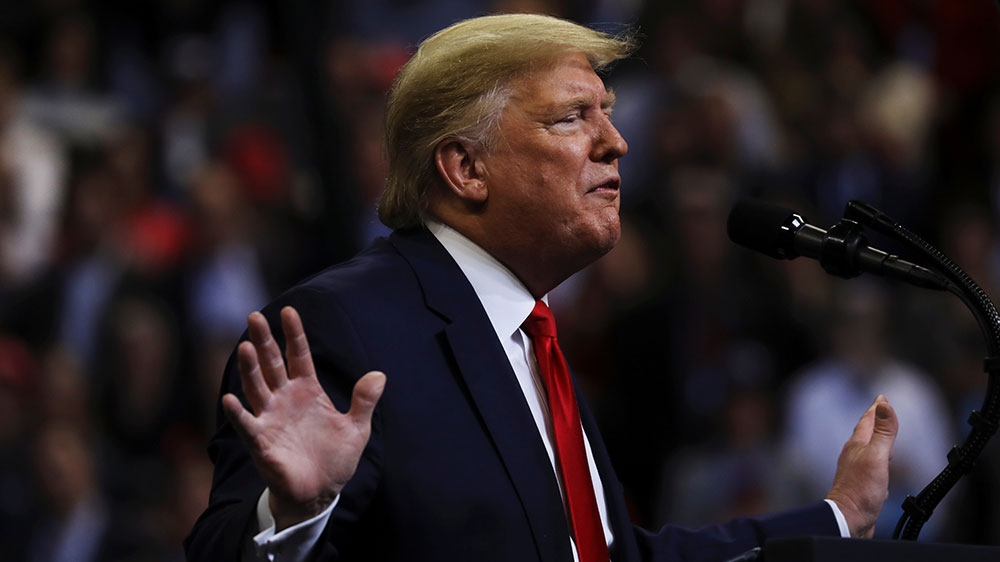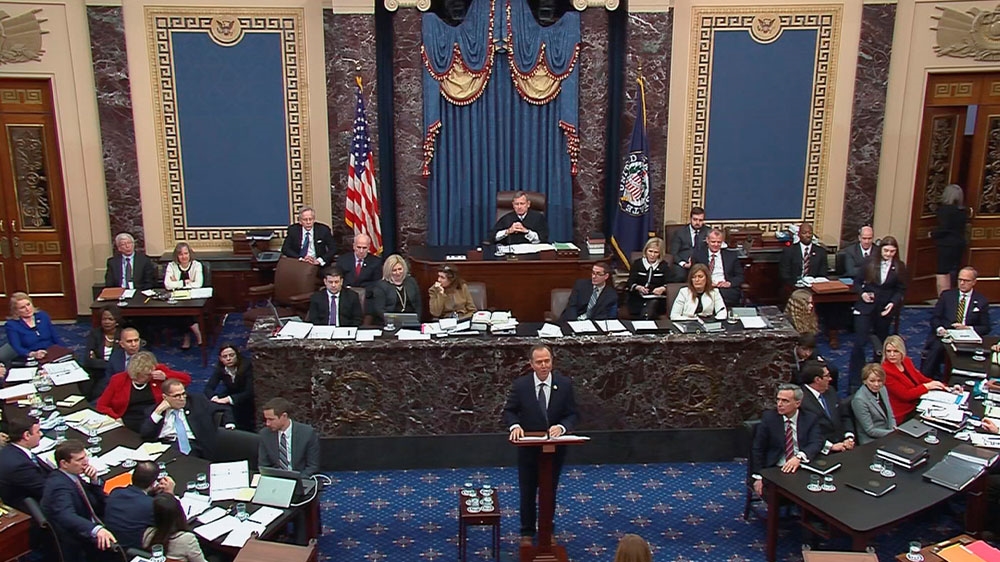
Trump impeachment trial: Blow for Democrats in witnesses battle
Key Republican senator says he'll vote against witnesses, boosting chances the Senate will vote quickly to acquit Trump.
US Democrats were served a significant blow late on Thursday after a key Republican senator said he would vote against calling new witnesses in the impeachment trial of United States President Donald Trump.
Following hours of questions, Republican Senator Lamar Alexander, considered a key holdout, said on Twitter he would oppose calling new witnesses.
"I worked with other senators to make sure that we have the right to ask for more documents and witnesses, but there is no need for more evidence to prove something that has already been proven and that does not meet the U.S. Constitution’s high bar for an impeachable offense," Alexander tweeted.
"There is no need for more evidence to conclude that the president withheld United States aid, at least in part, to pressure Ukraine to investigate the Bidens; the House managers have proved this with what they call a 'mountain of overwhelming evidence.'" he added.
Following Alexander's comments, it appeared that the best Democrats could hope for was a possible tie on the question of witnesses. But even a tie would likely lead to a defeat.
More:
Republican Senator Susan Collins announced on Twitter she plans to vote for witnesses. Republican Senator Mitt Romney has suggested he too will vote for witnesses.
The remaining holdout was Republican Senator Lisa Murkowski, who argued in a submitted question that additional witnesses could be necessary.
"The dispute about material facts weighs in favour of calling additional witnesses with direct knowledge," Murkowski said. "Why should this body not call Ambassador Bolton?"

Trump speaks during a campaign rally at Drake University in Des Moines, Iowa [Leah Millis/Reuters]
Democrats needed four Republicans to join them in voting for witnesses. Only three would result in a tie in the 100-member Senate.
If that were the case, Supreme Court Chief Justice John Roberts, who is presiding over the trial, could step in to break the tie. But there is so little precedent for impeachment trials - this is only the third of a president in US history - that Senate aides said there was no way to know exactly what would occur. Even if Roberts decided to break the tie in the Democrats' favour, the Senate could override his decision with a simple majority vote.
Possible testimony from Bolton was of particular interest after a report - which he has not denied - that he planned to say in an upcoming book that Trump told him he wanted to freeze $391m in US military aid for Ukraine until it investigated Democratic presidential contender Joe Biden and his son Hunter, who worked for a Ukrainian energy firm while his father was vice president.
The Democratic-controlled House of Representatives impeached Trump in December, formally accusing him of abusing his power for pressuring Ukraine to investigate the Bidens. The House also charged Trump with obstruction of Congress.
Two-thirds of the Senate is required to remove Trump from office. He is unlikely to be convicted. Republicans hold a 53-47 majority.
Trump's acquittal would allow him to claim vindication just as the Democratic Party holds its first nominating contest for the November 3 election in Iowa on Monday.
Trump held a rally in Des Moines, Iowa, on Thursday night and slammed the trial, calling it an effort by Democrats to overthrow his 2016 election victory.
"They want to nullify your ballots, poison our democracy and overthrow the entire system of government," Trump said.
But he also said "This is a happy period for us. We call this Impeachment Light."
Roberts refuses to read question
The two sides also sparred over the unnamed government official whose whistle-blower complaint about Trump's dealings with Ukraine spurred the drive to remove him from office.
Trump and some other Republicans have pressed for months to unmask the intelligence official who filed the report and have tried to paint that person as a partisan figure working with Democrats to destroy Trump's presidency.
The government has provided security to the whistle-blower in response to security threats, according to the person's lawyers.
On Thursday, the issue boiled to the surface again when Roberts refused to read a question from Republican Senator Rand Paul that included the name of a person that right-wing media have accused of being the whistle-blower. Paul is one of several Republicans, including Trump, who have posted social-media links to some of those news articles.

Chief Justice John Roberts listens after declining to read a question submitted by Senator Rand Paul [Senate TV/AP Photo]
"The presiding officer declines to read the question as submitted," Roberts said. He had rejected a similar question the day before. It was a rare show of decision-making power Roberts holds on certain issues in the trial.
Paul said his question, which asked whether that person worked with a member of Democratic Representative Adam Schiff's staff to impeach Trump, was not meant to unmask the whistle-blower.
"My question's not about the whistle-blower. My question's about two people who are friends," he told reporters.
Democrats disagreed.
"This question was really framed and intended to expose the identity of the whistle-blower and subject that whistle-blower to retaliation," Democratic Senator Richard Blumenthal told reporters.
Bradley P Moss, a lawyer whose firm represents the whistle-blower, called the Republican effort "a stain on the legacy of this constitutional republic".
What's next?
On Friday, each side is expected to present closing arguments in four hours of debate about whether to call witnesses.
If the vote on witnesses is 50-50 and Roberts declines to break a tie, the vote deadlock would mean a defeat for Democrats.
Schiff, the lead Democratic prosecutor in the trial, proposed that both sides conduct closed-door witness depositions for a week while the Senate returns to normal business.

Lead manager House Intelligence Committee Chairman Adam Schiff delivering opening argument during the second day of the Senate impeachment trial of US President Donald Trump [Senate TV/Handout via Reuters]
But there was no sign his plea was being considered by Republicans.
If Republicans are able to block witnesses, the trial could come to an abrupt end on Friday or early Saturday.
In the impeachment trial of former President Bill Clinton, there were several days of closed-door deliberations before a vote to acquit took place.
But Republicans have said if they have the vote, they may push to skip deliberations and move straight to a vote.
It is still unclear if that means a vote could come on Friday, in the wee hours of Saturday morning or later on Saturday. Democrats could try to delay it by presenting a number of motions.
"I can tell you that we have a high level of interest in just getting this done," CNN quoted Senate Majority Whip John Thune as saying.